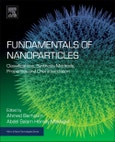Fundamentals of Nanoparticles: Classifications, Synthesis Methods, Properties and Characterization explores the nanoparticles and architecture of nanostructured materials being used today in a comprehensive, detailed manner. This book focuses primarily on the characterization, properties and synthesis of nanoscale materials, and is divided into three major parts. This is a valuable reference for materials scientists, and chemical and mechanical engineers working in R&D and academia, who want to learn more about how nanoparticles and nanomaterials are characterized and engineered.
Part one covers nanoparticles formation, self-assembly in the architecture nanostructures, types and classifications of nanoparticles, and signature physical and chemical properties, toxicity and regulations. Part two presents different ways to form nanometer particles, including bottom-up and top-down approaches, the classical and non-classical theories of nanoparticles formation and self-assembly, surface functionalization and other surface treatments to allow practical use. Part three covers characterization of nanoparticles and nanostructured materials, including the determination of size and shape, in addition to atomic and electronic structures and other important properties.
Please Note: This is an On Demand product, delivery may take up to 11 working days after payment has been received.
Table of Contents
1. Nanostructures for Imaging, Medical Diagnostics and Therapy 2. Nature's Nanoparticles-Using Viruses as Nanomedicines and for Bio-Imaging 3. Catalytic Applications of Janus Nanoparticles 4. Tailored Nanomaterials for Antimicrobial Applications 5. Nanocomposite Polymer Film for Antibiofouling Materials Surfaces 6. Engineered Nanomaterials for Wastewater Treatment: Current and Future Trends 7. Functional Thin Films and Nanostructures for Sensors 8. Nanoarchitectured Carbon-Metal Oxide Electrodes for Supercapacitance Energy Storage 9. Engineered Nanomaterials for Papermaking Industry 10. Excipients Used in Oral Nanocarrier-Based Formulations 11. Applications of Nanoparticle Technologies in the Construction Industry. A Step Forward Toward Greener Buildings 12. The Application of Ionic Liquids in Nanotechnology 13. Nanostructured Self-healing Polymers and Composites 14. Drug Scavenging Lipid Based Nanoparticles as Detoxifying Agents in vivo 15. Nanostructured Polymer Scaffolds for Tissue Engineering Technology 16. Functional Thin Films and Nanostructures for Sensors 17. Micro/nanocapsules for Anticorrosion Coatings 18. Nanoradiopharmaceuticals in Current Molecular Medicine








